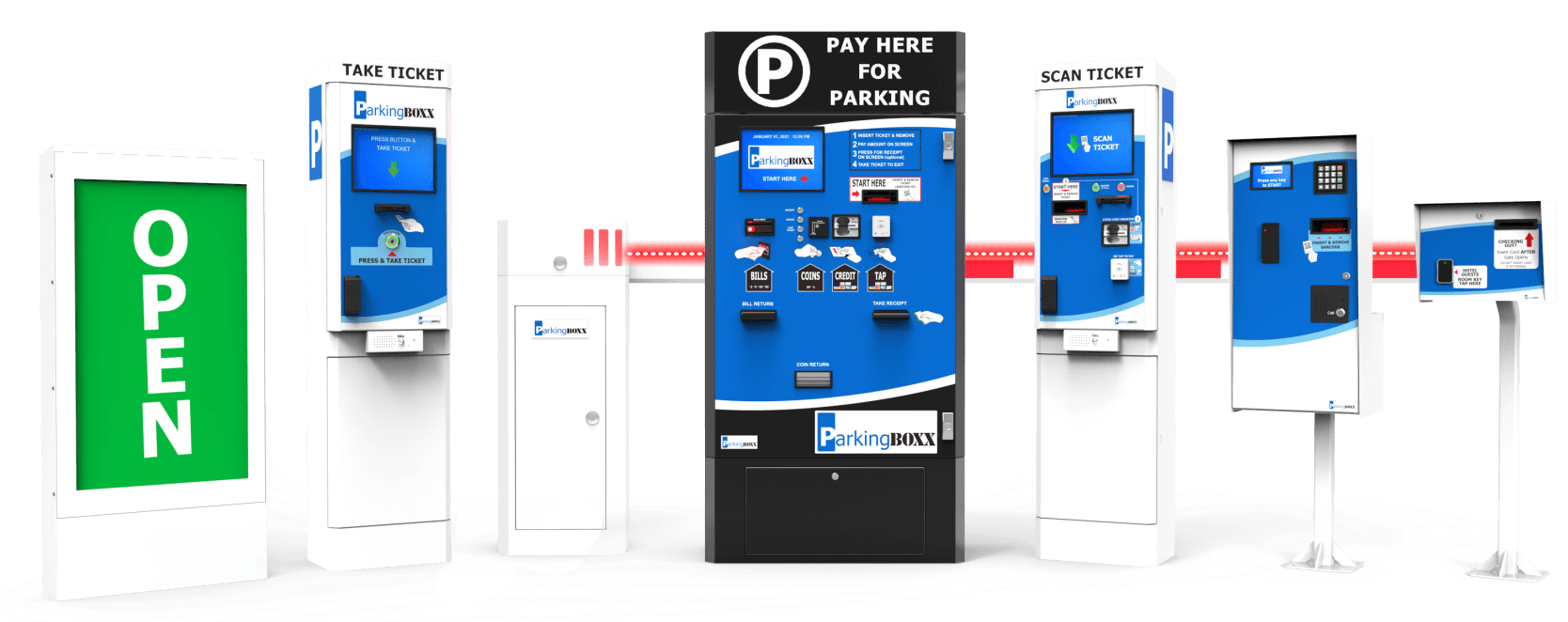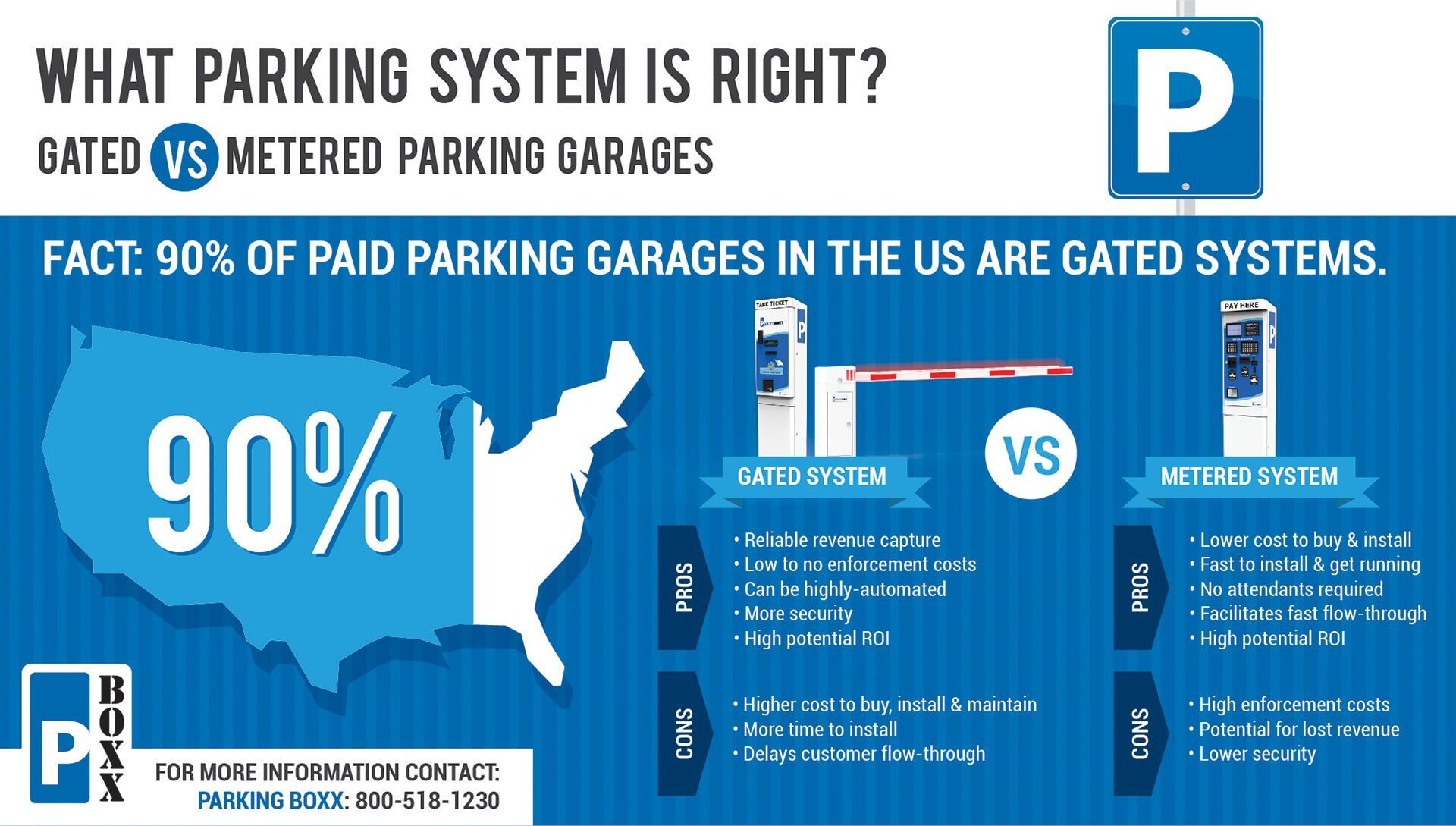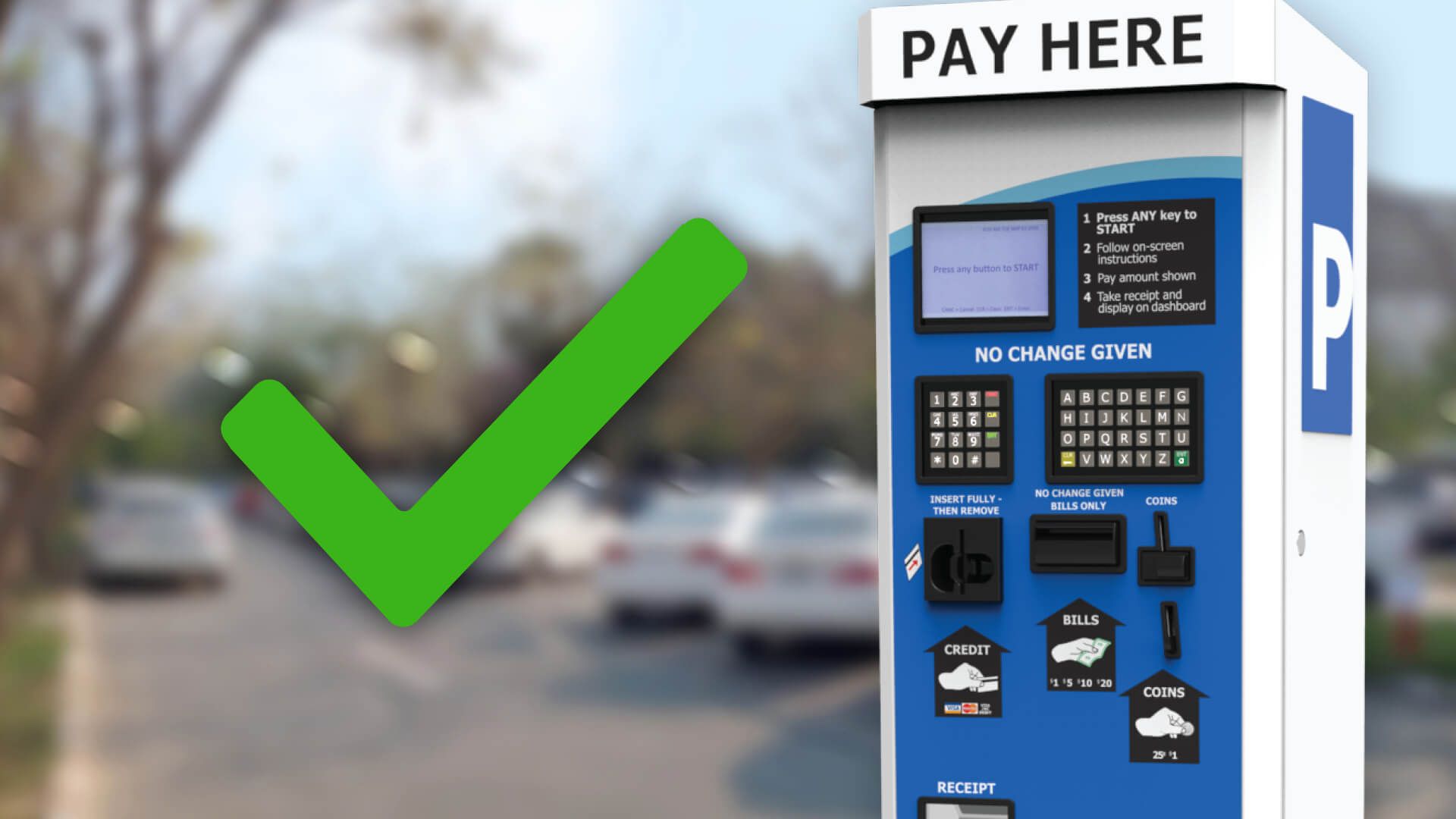
A well-designed parking system can streamline operations, enhance user experience, and maximize revenue for your parking lot or garage. Whether you manage a lot for monthly parkers, transient customers, or a mix of both, selecting the right parking management system involves evaluating user needs, control methods, payment options, and advanced features.
At Parking BOXX, we offer customizable parking systems that cater to businesses of all sizes, from small lots to large commercial facilities. This guide explores key considerations—such as automated parking systems, payment solutions, and budget options—to help you choose the perfect parking solution. Use our checklist to assess your needs and discover how our technology, like license plate recognition (LPR) and smart payment kiosks, can optimize your operations.
Contact Us or call 800-518-1230 to speak with one of our parking professionals for a free consultation about your specific needs!
What is an automated parking system?
Key components include:
- Entry Terminal: Controls vehicle entry by issuing tickets, scanning license plates, or validating access credentials.
- Exit Terminal: Manages vehicle exits, verifies payments, or confirms authorized departure.
- Pay Station: Facilitates payments through cash, card, or mobile apps, often with unattended kiosks for convenience.
- Barrier Gate for Access Control: Physically restricts unauthorized vehicles, ensuring only validated users enter or exit.
- Smart Technologies with AI-Driven Insights: Leverages data analytics, license plate recognition (LPR), and AI to monitor usage, detect violations, and optimize operations.
These components work together to create a seamless, secure, and efficient parking experience for operators and end users alike.
Benefits of Automated Parking Gate Systems
1. Improved Efficiency
Automated gate systems streamline parking operations by reducing manual tasks. Entry terminals issue tickets or validate access in seconds, while exit terminals ensure quick departures with pre-verified payments. Pay stations, whether drive-up or walk-up, support multiple payment methods, including contactless mobile payments, minimizing wait times. Smart technologies with AI-driven insights analyze traffic patterns to optimize gate operations, reducing congestion during peak hours.
For example, a retail parking lot using an automated parking system can process hundreds of vehicles daily with minimal staff, ensuring smooth operations even during busy periods.
2. Enhanced Security for Operators and End Users
Security is a top priority for parking facilities. Barrier gates for access control prevent unauthorized vehicles from entering, protecting both the facility and parked cars. Smart technologies like license plate recognition (LPR) and video surveillance deter theft and vandalism by tracking every vehicle. AI-driven insights can flag suspicious activity, such as vehicles lingering too long or attempting multiple entries without payment.
For end users, secure pay stations with encrypted transactions ensure safe payments, while entry and exit terminals provide clear access protocols, reducing confusion and enhancing safety.
3. Cost Savings and Revenue Optimization
By automating processes, operators reduce labor costs associated with manual ticketing or patrolling. AI-driven insights help identify revenue opportunities, such as adjusting pricing during high-demand periods or offering reservations for premium spots. Pay stations with validation options (e.g., coupons or electronic discounts) encourage repeat customers, boosting revenue for businesses like shopping centers or event venues.
4. Seamless User Experience
End users benefit from intuitive systems that make parking hassle-free. Entry terminals with touchscreens or mobile app integration simplify access, while pay stations offer flexible payment options, including online payments without app downloads. Exit terminals ensure quick departures, reducing frustration. AI-powered features, like real-time space availability or reservation systems, further enhance convenience.
Key Features of Parking Systems
1. Barrier Gates for Access Control
Barrier gates are the backbone of any automated gate system, ensuring only authorized vehicles enter or exit. These gates are durable, weather-resistant, and integrate with entry and exit terminals for seamless operation. Advanced models use sensors to detect vehicle size, preventing tailgating and ensuring accurate access control.
2. Entry and Exit Terminals
Entry terminals issue tickets, scan license plates, or validate credentials like RFID cards or mobile apps. Exit terminals verify payments or access rights before raising the gate. Both systems integrate with smart technologies to track usage and provide real-time data to operators.
3. Pay Stations
Modern pay stations support multiple payment methods, including credit cards, mobile apps, and contactless payments. Unattended kiosks at exit lanes or walk-up stations reduce staffing needs, while online payment options via cell phones offer convenience without requiring app downloads.
4. Smart Technologies with AI-Driven Insights
AI transforms parking management by analyzing data from entry terminals, exit terminals, and pay stations. Features like license plate recognition (LPR) automate vehicle tracking, while AI voice agents assist with inquiries.
.
5. Optional Features
- Parking Reservations: Allow users to book spaces in advance, ideal for events or busy locations.
- Video Surveillance and Intercoms: Enhance security with live monitoring and communication.
- Validation Systems: Offer discounts via printed coupons, handheld devices, or web-based platforms.
Who Uses Your Parking System?
Understanding who uses your parking lot is the first step in designing an effective parking system. Common user types include:
- Monthly Parkers/Employees: Ideal for office buildings or residential complexes where users park regularly.
- Transient/Paying Customers: Suited for retail centers, airports, or event venues where users pay per use.
- Hybrid Systems: Combine monthly and transient options for mixed-use facilities.
For example, a lot for employees may prioritize access control, while a customer-focused lot needs flexible payment options.
Parking Control Methods
Effective parking control systems ensure security and efficiency. Popular methods include:
- Barrier Gates: Restrict access and track entries/exits.
- Garage Doors: Secure indoor facilities with controlled access.
- Patrolling with Ticketing/Towing: A low-tech option for smaller lots, ensuring compliance through manual enforcement.
Choose a control method based on your lot’s size, traffic volume, and security needs. For high-traffic areas, automated parking systems with barrier gates and license plate recognition (LPR) can streamline operations.
Parking System Control
Different types of parking systems have different methods of control. There may be control over or a barrier to access to the parking lot or garage via barrier gates, garage doors, tiger teeth or some combination of these items. Also there is the control mechanism for how that barrier opens. Examples include: press a button & take a barcode parking system, present RFID parking system or hotel guest card, press a Call for Assistance button.
If there is no barrier mechanism to control access at a pay on exit parking system, then the parking area would need to be monitored for parking violations.
Optional Features to Enhance Your Parking System
Advanced features can elevate your parking system to meet specific needs:
- Printed Validation Coupons: Low-cost discounts for customers (e.g., retail shoppers).
- Handheld Electronic Validation: High-tech solution for high-volume lots.
- Web Validation: Manually enter tickets via any computer, ideal for low-volume use.
- Parking Reservations: Allow users to book parking in advance, perfect for events.
- License Plate Recognition (LPR): Automates entry/exit and enhances security.
- Video Cameras and Intercoms: Improve safety with voice or video communication.
These features can differentiate your parking management system and improve user experience. For example, LPR reduces manual oversight, while reservations boost convenience for event-goers.
Budgeting for Your Parking System
Budget is a key factor when choosing a parking system. Options range from affordable to premium solutions:
- $500: Basic parking app for small lots.
- Under $5,000: Smart parking meter for moderate needs.
- $20,000: Flat-rate gated system, ideal for simpler setups.
- $40,000+: Fully featured gated system with advanced options like LPR and reservations.
Use a parking ROI calculator to evaluate long-term savings and revenue potential. Our team at Parking BOXX can help you find a parking solution that fits your budget and goals.
Why Choose Parking BOXX Parking Systems?
At Parking BOXX, our parking systems are designed to optimize efficiency, security, and revenue. With customizable solutions, industry-leading technology like LPR, and dedicated support, we help businesses of all sizes create seamless parking experiences. Whether you need a smart parking system for a small lot or a comprehensive parking management system for a large facility, we’ve got you covered. Contact us today for a free consultation or demo!
For a more detailed comparison of gated vs. metered parking, please read in more details below.

To gate or not to gate parking systems is often the question.
When procuring a
parking solution , how can you know whether you need a gated parking system?
It isn’t necessarily about the scope of your parking operation. Even owners of large parking facilities, including multilevel garages, sometimes choose an ungated, metered commercial parking system. And for good reasons, as we’ll discuss.
In an assessment on behalf of the City of Miami Beach, Walker Parking Consultants performed an “Analysis of Gated v. Metered Enforcement” methods, in 2015. The assessment provides solid insight into when gated makes sense, and when a metered parking system may be appropriate.
According to Walker, 90% of paid parking garages in the US have barrier gates (p.1). While both metered and gated systems have advantages and disadvantages, gated systems allow for reliable revenue capture with nil enforcement costs. At the same time, metered systems are an ideal solution for street parking and present certain financial advantages.
In this article, we look in more detail at the pros and cons of gated smart parking systems versus metered systems, with a focus on costs and revenues.
According to the International Parking Institute survey, demand for greater parking revenue is one of the top 10 trends in parking today (p. 50). This comes as no surprise. For private and public parking facility owners, parking revenue must justify the use of resources.
Ga ted parking systems, by design, garner 100% of revenue. Parking customers must pay their ticket to exit the parking facilit y. This feature makes it easier to estimate revenues for gated parking systems.
In contrast, there are several factors that must be considered to estimate revenues from a metered parking system.
Revenue for metered parking systems depends, in part, on payment compliance rates. Where enforcement is vigilant, compliance rates are higher, but so are costs.
The City of Miami Beach asked Walker Parking Consultants to evaluate the impact of parking citations, or parking tickets, on revenue in a metered system. Walker’s analysis shows that citations can generate additional revenue to offset the costs of enforcement, but several factors must be considered. The revenue from citations varies depending on the:
- Citation capture rate (how many infractions lead to tickets)
- Collection rate (how many tickets are paid in full)
- The amount of the fines levied/ the average parking ticket fee
There is yet another unique calculation involved in metered parking system revenues. Parking customers sometimes overpay at a meter, to avoid a possible citation. In the case of Miami Beach, Walker estimated that a conservative 3% of additional revenues could be anticipated from overpayment at meters (p.11).
Overpayment at meters is less likely with a mobile payment option, like our P-123. Using P-123, customers can extend their time remotely. This reduces overpayment revenues, but increases customer satisfaction.
It should be noted that overpayment occurs with gated parking systems as well. When customers pay by the hour, their fee is rounded up to the nearest hour. In a pay-by-the-hour parking lot, the rate for a 70-minute session is the same as the rate for a full two hours. (Walker, p.18)
According to parking consultants, Kimley-Horn and Associates, there is a revenue advantage to choosing a parking system with the capacity to self-report when full. Revenue losses can be averted if the machines are never allowed to remain full. (p. 13)
Kimley-Horn also points out the importance of built-in accountability. “Since revenue is tracked and all access to the revenue compartment and coin vault can be recorded and audited, “leakage” is greatly reduced” (p. 13). This is especially true when access is controlled electronically and fully auditable.
Parking systems can be configured to issue email or text alerts when bill or coin areas are full, low, or to flag a completed collection. Some parking meters have individual access codes for collectors. Meter collectors must enter their code to log in and run audit reports before collecting cash. Failure to log in triggers an alarm and email or text alerts to the parking system management.
Kimley-Horn report that “vendors’ back-end meter management and revenue tracking software vary in capability. In fact, this aspect of a manufacturer’s product line – i.e., the back-end software, has recently become a significant differentiator among vendors” (p. 13).
Having parking software that offers a high degree of accuracy and timely revenue data, plus advanced integration, ensure that many business goals may be achieved.
Why Gated Parking Systems Have Lower Costs and Higher Revenues

- Is appropriate for smaller lots or areas that have low parking charges, and may not be able to support the higher investment required from gated systems;
- Requires a lower upfront capital investment;
- Is a simple solution, with few components;
- Can be installed quickly, with little to no civil work;
- Facilitate fast exit for high volumes of traffic in and out of the garage, without queuing.
- While metered parking systems require higher ongoing enforcement costs, for some owners, these costs are already committed and can’t be reduced.
Request a consultation today!





